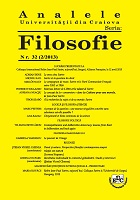LE COMPAGNON DE ROUTE SARTRE ET LE PARTI COMMUNISTE FRANÇAIS ENTRE 1952 ET 1956
THE FELLOW TRAVELER. SARTRE AND THE FRENCH COMMUNIST PARTY BETWEEN 1952 AND 1956
Author(s): Miklós NagySubject(s): Political Philosophy, Post-War period (1950 - 1989), History of Communism
Published by: Editura Universitaria Craiova
Keywords: Communism; communist ideology; Communist Party; Hungarian revolution;
Summary/Abstract: Nowhere else but in France after the second world war was the issue of Communism able to succeed in gaining so many intellectuals. The party attracted an extensive, so – called ’fellow traveler’ intellectual circle as well including philosopher Jean Paul Sartre, who, without belonging to the party, supported its general tendency. The reason why it is especially significant that the writer, who had always emphasized his independence, became a ’fellow traveler’, is because he chose to support the socialist camp as opposed to the American imperialism, and taking advantage of his international prestige he took an active role in the antiimperialist peace-movement. In the background of Sartre’s break with the Communist Party is the contrary judgment of the 1956 Hungarian revolution. Sartre firmly disapproved the Soviet intervention contrary to the attitude of French Communist Party legitimating military intervention. By his disapproval he started a large - scale disillusionment from communist ideology as well as the distancing of the intellectuals from the Communist Party.
Journal: ANALELE UNIVERSITĂȚII DIN CRAIOVA. SERIA FILOSOFIE
- Issue Year: 2/2013
- Issue No: 32
- Page Range: 31-40
- Page Count: 10
- Language: French

